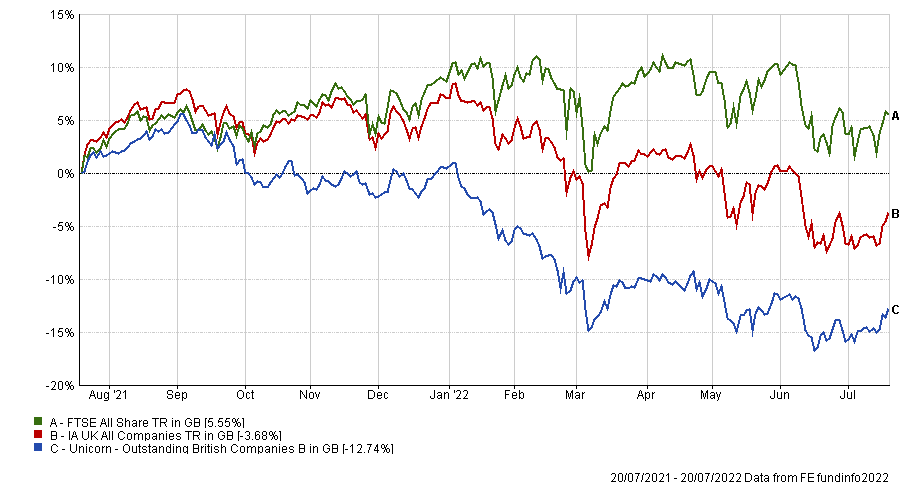Since the beginning of the year, investors in mid-caps within the FTSE 250 have had to contend with tough market conditions, which have led to a 16% fall in total return year-to-date.
This is particularly poor versus their larger peers in the FTSE 100 index, which have managed to stay afloat, up around 1%.
This dichotomy between the regions of the UK stock market has hit the Unicorn Outstanding British Companies fund hard. The multi-cap fund has a bias towards the FTSE 250 and is down 12.7% over the past 12 months versus a 3.7% drop for its IA UK All Companies sector average peer.
Below, manager Chris Hutchinson, explains why investors should remain cautious when investing in markets today and why he will never buy an oil or commodities company.
Performance of fund over 1yr against sector and benchmark

Source: FE Analytics
What is your investment strategy?
I follow what I call ‘the basics of investment’, paired with knowledge of how businesses work. I like to keep it simple and stick to what I know.
At Unicorn, we have never been product-led, but rather performance-led. I look to find profitable businesses that sell products or services that provide real benefits to their customers.
There is a lot of noise to filter out, so I work very hard to identify these businesses and then spend time to get to know them. Alignment of interest is key: when I talk to companies, I want to see the person running it holding a decent stake in that business, so that it means something to them.
Are you finding new opportunities at the moment?
There's not a lot out there right now that has really performed, unless you've been running a fund with energy, mining or commodities exposure which are very seasonal and I wouldn't recommend them. When we do find an opportunity, we commit to it. But it doesn’t mean that we always get it right…what we can say is that we are holding quality businesses at more attractive valuations than we have seen in the last 10 years, when that happens, we start to get a little excited.
What has been your worst performer recently?
James Fisher. It’s a shipowner and provider of marine engineering services that I had known for many years. We had owned it and it had done very well. Then a new chief executive came in and there was a series of other problems.
With hindsight, it was fairly obvious the company was going to struggle. What I should have done is use the benefit of my experience to know that there were enough signals to sell out. In the past 12 months shares are down 60%. I'm annoyed about it, because I should have known better and I should have reacted quicker.
Conversely, what has been your best pick over 12 months?
On the 'other end of the scale', over 12 months Euromoney is up 39% but actually, I prefer talking about my mistakes. I have no better a crystal ball than anyone else and my top performer today might be my next worst.
In this industry, people get carried away, but as a fund manager you have to understand that you will never get it right all the time. And if you start getting it right all the time, or you tell people you're going to get it right all the time, you're potentially going to disappoint them.
That’s why we're quite reserved at Unicorn, and that’s why I always tell our investors that there will be tough times and that they’ll potentially lose their money.
Why should investors pick your fund?
The vast majority of our businesses have strong balance sheets, are trading well and haven't been particularly impacted by the inflationary environment or the conflict in Eastern Europe. Some of them have been enduring supply chain constraints and longer lead times, but no particular problem.
To me, that sends a massive message because it means that we're not exposed to weak businesses. The performance of our funds has been picking up steadily over the past few months, and I very much expect it to be very strong going forward.
Strategically, is this the right time to be buying small-caps?
This is probably not the right time to be plunging money into the market. But it’s a temporary situation that we're enduring at the moment, and I would absolutely encourage people to start putting small amounts into the market.
If you are thinking of buying into a fund don’t go for the shooting stars. There are funds out there that are being promoted quite aggressively and growing incredibly rapidly. They do well for a while, and then suddenly there are no exit strategies and they end up losing a lot of money mainly because they got too ambitious or too successful.
Dripping money into specific funds with very clear strategies – funds that have probably had a reasonably tough times for various reasons – that's not a bad idea.
Are there other sectors you won’t invest in?
We never invest in mining, commodities or oil and gas. Those places are hugely capital-intensive and you have no idea when you get your money back. Plus, the price that you get when you sell commodities depends on the cycle.
We are also not exposed to consumer retail, as many of those businesses provide no defence when things go wrong. We are seeing it now with inflation and the cost-of-living crisis. When discretionary spending stops, those businesses have nowhere to go.
What do you do outside of fund management?
I collect tribal masks and I travel to Liguria, Italy, where I’d like to retire someday, somewhere on the Riviera di Levante.





